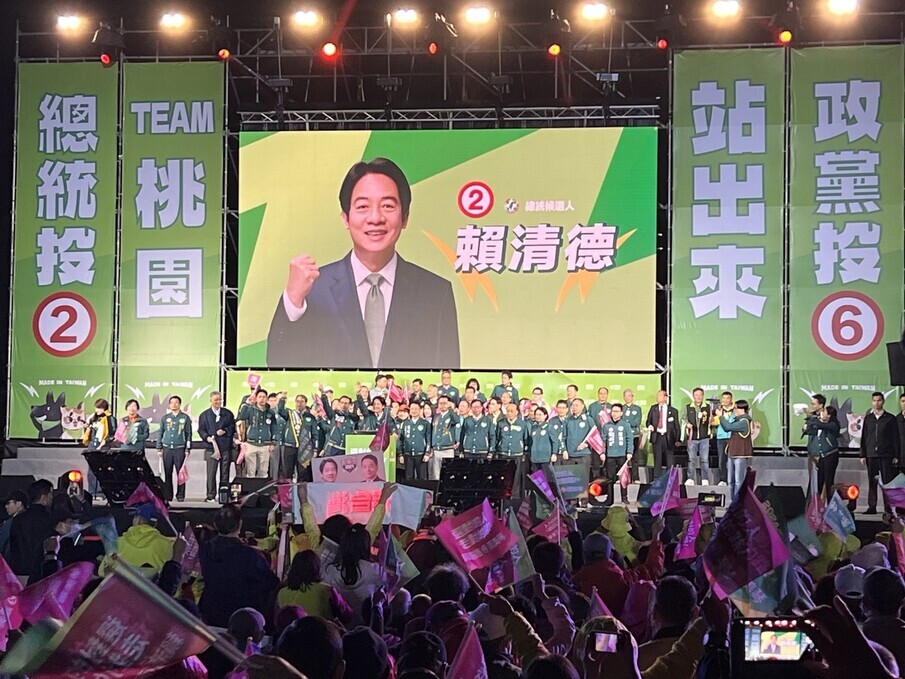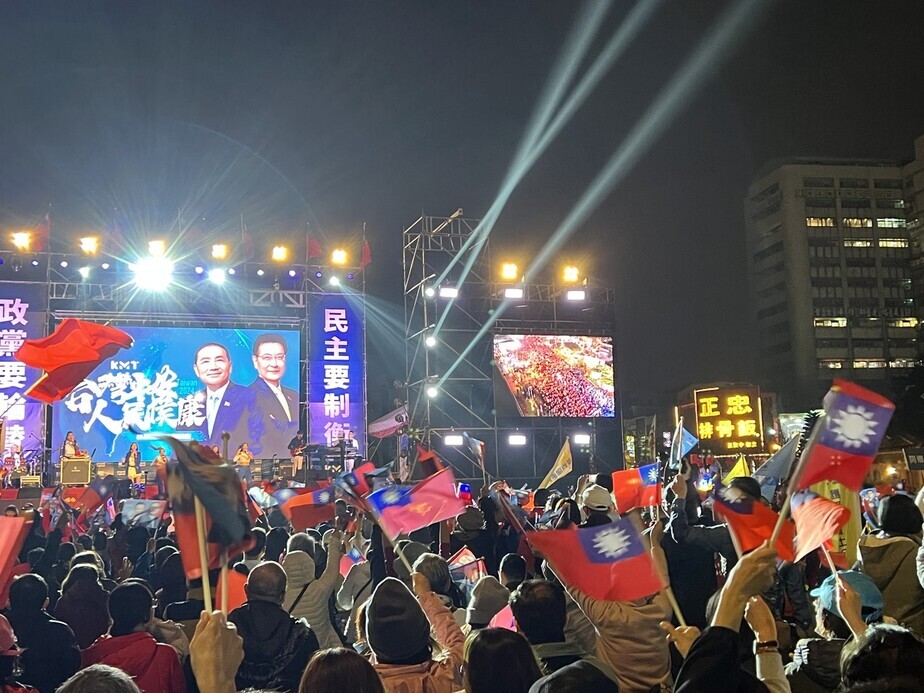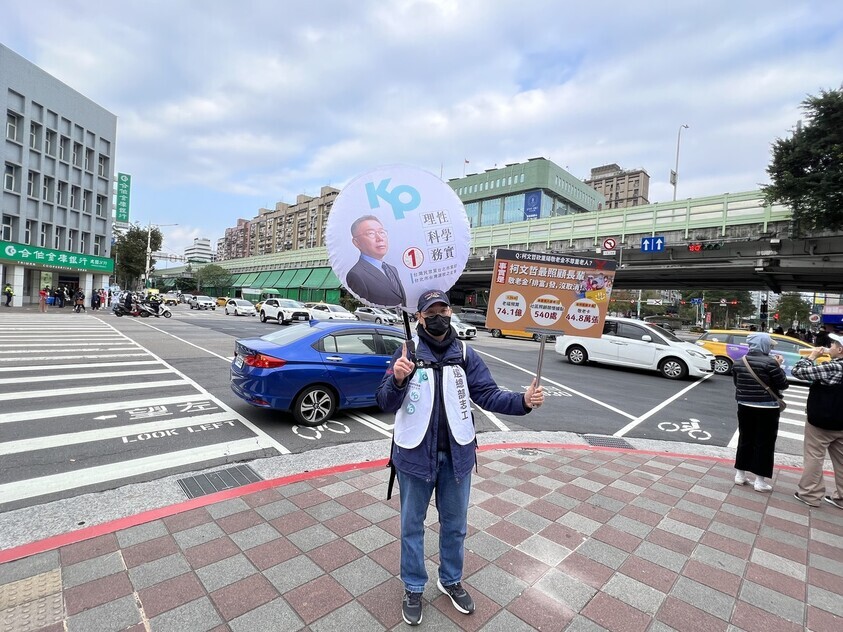hankyoreh
Links to other country sites 다른 나라 사이트 링크
[Reportage] Economy, not China, on Taiwanese voters’ minds on eve of election

At 3:18 pm on Tuesday, Taiwanese smartphone users heard a loud warning tone and received an emergency message reading “[Air raid alert] Missile flyover Taiwan airspace, be aware.” The word “missile” actually appeared only in the English translation — the Chinese version used the word “weixing,” which means “satellite.”
Chang Hui-wen, a 63-year-old resident of Taipei’s Wenshan District, seemed quite startled by the alert.
“I haven’t heard or seen any alerts like this recently. Maybe it’s because of the upcoming election,” Chang said, looking up at the skies.
Shortly afterward, Taiwanese social media was abuzz with articles and information posted by ordinary citizens. The response was faster than usual because the news had to do with China, which has been one of the key topics in Taiwan’s presidential race.
Some expressed concerns about Chinese interference in the election; others criticized the current Taiwanese administration as fomenting fear. At around 9 pm that day, Taiwan’s Defense Ministry apologized for the incorrect use of “missile” as an English translation.
That afternoon at around 3 pm, the China Central Television (CCTV) network reported the launch of a new astronomical satellite, the “Einstein Probe,” on a Long March 2C rocket from a satellite launch center in Sichuan Province.
The world’s attention has been focusing on Taiwan as it prepares for its presidential and legislative elections taking place on Saturday.
Geopolitically, Taiwan has been the so-called “unsinkable aircraft carrier,” representing the front lines of the strategic rivalry between the US and China. Geoeconomically, it is a key global semiconductor base, home to the company TSMC.
The ruling Democratic Progressive Party (DPP) leans anti-China and pro-US politically, while the opposition Kuomintang (KMT) has been moving in a more conciliatory direction with Beijing. Because of this, some have talked about the Taiwanese presidential election as a kind of proxy battle between the US and China.
Taiwan as a whole has become the site of a political festival combining the hopes, expectations, and tensions of some 19 million voters.

Every four years, it holds elections in which the president and members of its legislature, known as the Legislative Yuan, are selected on a single day. The presidential election is seen as especially important, but the Legislative Yuan is essential for governing, and there is also a heated contest to capture as many seats there as possible.
With the election a week away, the DPP and KMT were campaigning just 2 kilometers apart on the evening of Jan. 6 in Taoyuan, one of Taiwan’s six largest cities. As soon as I arrived at the KMT campaigning site at Taoyuan’s Laojie River Station, I heard a familiar song playing at high volume: “Pure Love” by the Korean group Coyote.
Throughout the site, giddy voters were waving little flags showing the face of KMT presidential candidate Hou Yu-ih.
“Hou Yu-ih! Frozen garlic! Hou Yu-ih! Frozen garlic!” they shouted. “Frozen garlic” is a slogan chosen because it sounds similar to the Chinese word for “to be elected.”
On the stage at the very front, the rally’s leaders busily fanned the atmosphere of cheers for their candidate’s election.
Huang Ming-kuang, 57, was there that day with family members.
“I don’t want to live anxiously anymore. I want to live peacefully and safely with my family,” he said, explaining his reasons for backing the KMT candidate.
Indeed, the KMT campaigning sites have been visited by many voters who feel upset over the mounting tensions with Beijing. One attendee surnamed Lee, who held a sign reading “peaceful Taiwan,” said, “I’m not advocating unifying with China, but economic exchange needs to be restored quickly.”
Two kilometers away from the KMT campaigning site, a similar event for the DPP began at around 7 pm. In Taiwan, current presidents are allowed to take part in campaigning. For this event, current President Tsai Ing-wen herself appeared to appeal for support.
At the front of the venue, stalls were selling souvenirs with slogans and photographs of DPP presidential candidate Lai Ching-te and vice presidential candidate Hsiao Bi-khim.
Holding up a mug bearing a photograph of Lai’s face, Chen Mei-shan said, “I don’t know what the result will be a week from now, for me at this moment, the next president is Lai Ching-te.”
“To preserve and develop democracy and freedom in Taiwan, we need ‘bi-te-ying,’” she added, using a Chinese phrase combining characters from Hsiao and Lai’s names with the word meaning “victory.” According to DPP estimates, some 60,000 people visited the campaign event that evening.
As Tsai took the stage, attendees welcomed her with a chant of “Tsung t’ung hao,” or “Greetings, Madame President.”
Appealing to voters to cast their ballots for Lai, Tsai said, “We have shown the world Taiwan’s democracy and progressivism. We have followed the right path.”
She also stressed the importance of backing the party for a majority of seats in the Legislative Yuan, which she referred to as the “engine” for state management.
Around nine o’clock, Lai arrived to declare, “We have seven days later. Let’s choose the right people and follow the right path.”
Currently, Lai holds a narrow edge over Hou in the polls. Attendee Hou Wei-lun said he hadn’t supported Lai in the beginning.
“There wasn’t any candidate that I supported. I decided to back [Lai] after catching a televised debate,” he explained.
“Lai Ching-te was accurate with his questions and answers in the debate. The other two candidates were just trying to duck difficult questions,” he said.
“A president should be someone who at least knows how to debate properly.”

Voters who don’t support either the DPP or KMT are throwing their support behind Ko Wen-je, a candidate for the minor Taiwan People’s Party. Chin Feng, a taxi driver I spoke to while traveling from the KMT campaign site to the DPP one that day, started off by saying, “Neither of those two.”
“The DPP can’t fix things the way we want. Young people can’t find jobs and are struggling with low pay,” he said.
“The KMT is too old now. I’m worried about us growing too close with China,” he added.
Chin went on to say, “I really like what Ko Wen-je showed as mayor of Taipei. He went to work by bus every morning at 7:30.”
“I’ve never seen anything like that from any other politician to date,” he added.
Ko, who has actively utilized digital platforms like social media and YouTube for his campaign, has proven popular among voters in their 20s and 30s.
“People in Taiwan will tell you that they’re more scared of the cars and motorcycles racing down the roads than an attack from China,” shared Hou Ting, a 29-year-old supporter of Ko. “It’s not like China would so easily launch an attack on Taiwan, so I’m tired of the political establishment overemphasizing China.”
While China was the biggest topic during the 2020 election, this time around “China fatigue” is on everyone’s lips.
Regardless of their preferred candidate, Taiwanese voters tend to be more interested in issues of day-to-day life than the relationship with China.
According to a poll carried out last July by National Chengchi University’s Election Study Center, an overwhelming majority of Taiwanese voters (88.1%) expressed a desire to maintain the status quo in relations with China. Findings of another poll by a Taiwanese media outlet released on Dec. 6 showed the economy to be the top concern (74.3%) picked by voters going into this election, followed by domestic politics (42.2%), relations with China (39.5%), and others.
“Some major Taiwanese corporations may operate on a global scale, but young people’s incomes don’t match that. Peace is important, and so is democracy and human rights. But right now, when I see my paycheck disappear each time I pay rent, I start to have my doubts about whether politics can really do much to change things,” shared Chou, a voter in Taiwan.
By Lee Jeong-yeon, staff reporter
Please direct questions or comments to [english@hani.co.kr]

Editorial・opinion
![[Editorial] Intensifying US-China rivalry means Seoul must address uncertainty with Beijing sooner than later [Editorial] Intensifying US-China rivalry means Seoul must address uncertainty with Beijing sooner than later](https://flexible.img.hani.co.kr/flexible/normal/500/300/imgdb/original/2024/0517/8117159322045222.jpg) [Editorial] Intensifying US-China rivalry means Seoul must address uncertainty with Beijing sooner than later
[Editorial] Intensifying US-China rivalry means Seoul must address uncertainty with Beijing sooner than later![[Column] When ‘fairness’ means hate and violence [Column] When ‘fairness’ means hate and violence](https://flexible.img.hani.co.kr/flexible/normal/500/300/imgdb/original/2024/0516/7417158465908824.jpg) [Column] When ‘fairness’ means hate and violence
[Column] When ‘fairness’ means hate and violence- [Editorial] Yoon must stop abusing authority to shield himself from investigation
- [Column] US troop withdrawal from Korea could be the Acheson Line all over
- [Column] How to win back readers who’ve turned to YouTube for news
- [Column] Welcome to the president’s pity party
- [Editorial] Korea must respond firmly to Japan’s attempt to usurp Line
- [Editorial] Transfers of prosecutors investigating Korea’s first lady send chilling message
- [Column] Will Seoul’s ties with Moscow really recover on their own?
- [Column] Samsung’s ‘lost decade’ and Lee Jae-yong’s mismatched chopsticks
Most viewed articles
- 1[Editorial] Transfers of prosecutors investigating Korea’s first lady send chilling message
- 2[Exclusive] Unearthed memo suggests Gwangju Uprising missing may have been cremated
- 3[Column] US troop withdrawal from Korea could be the Acheson Line all over
- 4Xi, Putin ‘oppose acts of military intimidation’ against N. Korea by US in joint statement
- 5[Column] When ‘fairness’ means hate and violence
- 6[Editorial] Intensifying US-China rivalry means Seoul must address uncertainty with Beijing sooner t
- 7‘Shot, stabbed, piled on a truck’: Mystery of missing dead at Gwangju Prison
- 8Spotlight turns to Hyundai Group Chairwoman’s visit to North Korea
- 9[Column] Samsung’s ‘lost decade’ and Lee Jae-yong’s mismatched chopsticks
- 10[Column] Will Seoul’s ties with Moscow really recover on their own?